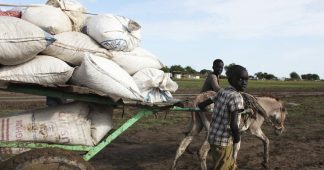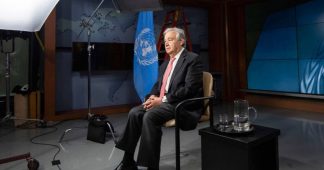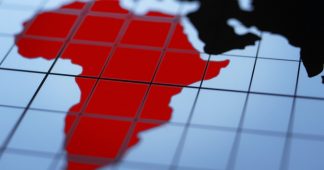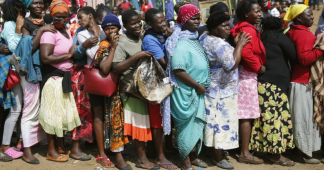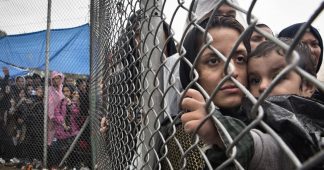by Pauline Imbach
4 May 2020
Had we been born yesterday, we would have been tempted to believe that the question of African debt was finally going to be taken seriously. Emmanuel Macron, wielding a magic wand, was about to cancel the continent’s debts, once and for all. Yet, like every bad magic trick, you could see how he did it and the illusion failed. Behind the cancellation announcement lies a real plan that will worsen the situation for all African countries.
Since 2011, Africa’s external public debt has more than doubled to reach 500 billion US dollars at present. Debt servicing [1] has followed the same growth curve and represents more than a quarter of some states’ total revenue (42% in the case of Angola, for example). On average, African countries spend 13% of their budget on servicing debt, and the situation will get worse. The situation will especially worsen for Sub-Saharan African countries where growth “is forecast to fall sharply from 2.4% in 2019 to -2.1 to -5.1% in 2020, the first recession in the region over the past 25 years.“ [2].
The African continent is largely dependent on export revenues and it is currently experiencing a drastic fall in commodity prices. Export revenues are indispensable for obtaining foreign currency reserves which enable debt repayments. Zambia, for example, which ranks 2nd in copper production on the continent, needs to restructure 1 billion dollars of its external public debt to avoid bankruptcy, yet since January 2020 copper prices have plummeted by 24% [3], while 75% of the country’s budget relies on mineral exports.
African countries’ fall in revenues is made worse by the global crisis which has seen financial capital repatriated to the North [4]. Large corporations and investment funds have moved their capital back to their parent companies and have placed them in fiscal optimisation schemes. On top of this, as a result of migrant workers’ revenues drying up due to lockdowns and the stoppage of large sectors of the economies in the North, there has been a drop in remittances sent by migrant workers to their home countries. According to the World Bank, remittances sent by migrant workers from the South amounted to 494 billion euros in 2019, that is three times as much as Overseas Development Aid, and over 700 million people in the South are directly dependent on that money. [5].
Countries dependent on the tourist industry and/or the massive presence of NGO workers have also seen a significant chunk of their revenue disappear. Other countries were already badly damaged by war and recent terrorist attacks (such as Burkina-Faso and Mali).
The current situation seems to be a dead end: a large number of countries on the Continent are on the verge of defaulting on debt repayments. In September 2019, the IMF declared that Congo-Brazzaville, Gambia, Mozambique, Somalia, South Sudan and Zimbabwe were already in a situation where they were defaulting on payments, and 11 other countries were close to doing so. [6].
When Emmanuel Macron spoke on 13th April he used the word “cancellation” in the middle of a lengthy speech on the Covid-19 pandemic, African debt was back in the limelight. Three days later, the G20 unsurprisingly announced a partial freeze of debt servicing, but there was no mention of cancellation. This agreement, which stated that it would give “leeway for countries to quickly respond to the crisis” [7] is actually nothing more than an abject media stunt.
The agreement actually consists of an 8 month deferment of debt servicing payments due between 1 May and 31 December 2020 for part of the debts of the 77 countries deemed to be the poorest. In order to access this mechanism, countries must be up-to-date with their payments to the IMF and the World Bank, meaning that creditors must deem them to be compliant. This delay is only applicable to bilateral debts between States, that is, 12 billion of the 32 billion euros of debt servicing scheduled for 2020 [8]. Meanwhile, States will continue to repay private creditors (including large banks) which hold 8 billion euros of debt, and multilateral creditors, such as the World Bank, which hold 12 billion euros of debt. Private banks will be able to make efforts towards deferment, on a voluntary basis… how nice! Finally, the repayments of actual debts scheduled for 2020 could be deferred until 2022, and then spread over 3 years, thus increasing the total cost of debt repayments! In 2022, 2023 and 2024, countries will have to pay back debt scheduled for those years and 2020 debt spread over those 3 years. In fine, “delaying debt payments will mean these will increase by 12.3 billion dollars, from 23 billion to 35,3 billion!” [9] It is undoubtedly this aspect which brings French Minister for the Economy and Finance, Bruno Le Maire, to deem this agreement “major progress” [10]…
It is worth noting that the total debt of the 77 countries eligible for the G20 programme amounts to 750 billion dollars, which represents approximately 1% of the G20’s GDP (78,286 billion dollars) [11], and is less than the German parliament’s own emergency funding programme (1100 billion euros), or that of the USA (2000 billion dollars), in the face of the Covid-19 pandemic… These debts are a drop in the ocean of finance! Pure and simple debt cancellation, without any strings attached, is perfectly possibly economically; however there is no political will to do so. What is at stake in the negotiations of the past few days and weeks has nothing to do with humanist ambitions. The pandemic serves as a smokescreen behind which creditors are setting up a system to manage the debts of the Global South to their advantage, in particular with historic creditors taking back control over the question of debt repayments.
Indeed, since 2005, the structure of African external debt has evolved significantly. Emerging economies (China, India, Kuwait and Saudi Arabia) have become essential creditors; China now holds 40% of the continent’s debt including 20% of public debt, amounting to 145 billion dollars. Alongside the Asian Infrastructure Investment Bank, China has become an unavoidable actor in financing large-scale projects, thus supplanting the World Bank in this domain.
Financial markets have acquired an important share of sovereign debt bonds (Eurobonds). Private creditors now hold 40% of Africa’s external public debt. In 2018, they received 55% of external interest payments, whereas traditional creditors like countries in the Paris Club (where France currently holds the position of secretary general) only received 28%, and 17% for international financial institutions, with the IMF and the World Bank in the lead. [12]. Thus, when African countries reimburse their external public debts more than half of the funds are earmarked for private creditors and there is no space for them to envisage defaulting on payments.
The risk is so great that even China, that usually operates independently, has agreed to discuss this issue with the Paris Club and the G20, which have both jumped at the chance to reassert their influence and attempt to reshuffle the cards. The big winners of this meeting are therefore creditors, especially private creditors. In what seems to be a repeat of what happened in the 2007 financial crisis, when large banks were saved by massive injections of public funds, the G20 has sent a strong message to capital markets and creditors by making available to them 1000 billion dollars’ worth of guarantees. Bruno Le Maire said that France applauded the IMF, the World Bank, and multilateral development banks for their swift mobilization in this crisis. (…) The IMF is ready to mobilize 1000 billion dollars. (…) The World Bank and regional development banks have already made 200 billion dollars available. (…) France has encouraged the international financial institutions to go even further in their response to the crisis, through the creation of new instruments. G20 Finance Ministers have taken the significant decision to encourage the IMF to create short term liquidity lines to accompany countries that are facing temporary liquidity difficulties. [13].
Thus, creditors can sleep soundly, as these new mechanisms will guarantee that their credits will be repaid and the vicious cycle of debt will continue: the newly “available” funds are not grants. They are new credit mechanisms which will turn into debt that must be repaid! The economic decisions which have been taken are a new trap for the African continent, for the poorest countries, as well as for humanity in its entirety. The health-care crisis has laid bare the fact that we are all in this together. Numerous studies correlate the structural causes of the Covid-19 pandemic with a system hell-bent on over-exploitation of land and resources on an international scale. Debt is built on a system of unlimited extractivism and productivism; without the over-exploitation of resources, debt could not exist [14]. We therefore need a radical change of paradigm: cancellation of public debt is a matter of survival for everyone.
Translated by Vicki Briault and Dimitri Cautain for the CADTM
Footnotes
[1] Debt servicing: the cost of meeting interest payments and regular contractual repayments of principal on a loan along with any administration charges borne by the borrower. See https://financial-dictionary.thefreedictionary.com/debt+servicing
[2] Africa’s Pulse, World Bank’s semestrial report, 9/04/2020. https://www.worldbank.org/en/news/press-release/2020/04/09/covid-19-coronavirus-drives-sub-saharan-africa-toward-first-recession-in-25-years
[3] Laurence Girard, « Le cuivre est laminé par le coronavirus », (Copper is steam-rollered by coronavirus), Le Monde, 21/03/2020. In French.
[4] Éric Toussaint, « Suspendre immédiatement le paiement de la dette pour sauver des vies », (Suspend debt payments immediately to save lives), Le Soir, 09/04/2020. In French.
[5] Julien Bouissou « La diaspora est devenue le bailleur de fonds le plus fiable » : l’indispensable argent des migrants, (The diaspora has become the most reliable creditor: the indispensable money of migrant workers) Le Monde, 15/12/2019. In French.
[6] Milan Rivié, “New debt crisis in the South”, CADTM, 12/08/2019. https://www.cadtm.org/New-debt-crisis-in-the-South. The 11 African countries at high risk of being over-indebted are: Burundi, Cameroon, Cape Verde, Djibouti, Ethiopia, Ghana, Mauritania, Sierra Leone, Central African Republic, Chad and Zambia. The full list from November 2019 is available here: https://www.imf.org/external/Pubs/ft/dsa/DSAlist.pdf
[7] Press statement by the French Minister of the Economy and Finance, 16/04/2020. https://www.economie.gouv.fr/reunion-virtuelle-g20-finances In French.
[8] Renaud Vivien, Antonio Gambini, Milan Rivié, « La fausse annulation de dettes africaines annoncée par le président Macron », (The phony cancellation of African debt announced by President Macron), Carte blanche, Le Soir, 16 April 2020. In French.
[9] Ibid.
[10] Julien Buissou, « Le G20 suspend le remboursement de la dette des pays pauvres, sans l’annuler », (The G20 suspends debt repayment for poor countries, stopping short of cancelling debts), Le Monde, 16 April 2020. In French.
[11] Idriss Linge, « Moratoire sur le service de la dette accordé par le G20 : un peu d’aide et beaucoup de com’ », (The moratorium on debt servicing granted by the G20 : a little bit of aid and a lot of publicity), Ecofin, 19 April 2020 https://www.agenceecofin.com/finances-publiques/1904-75852-moratoire-sur-le-service-de-la-dette-accorde-par-le-g20-un-peu-d-aide-et-beaucoup-de-coms In French only.
[12] https://dette-developpement.org/Club-de-Paris-Comment-sont-restructurees-les-dettes-souveraines-et-pourquoi-une (How sovereign debt can be restructured and why). In French.
[13] Press statement: Bruno Le Maire’s response to the online meeting of G20 Finance, 15/04/2020 https://www.economie.gouv.fr/reunion-virtuelle-g20-finances In French.
[14] On this subject, seeNicolas Sersiron, « Pourquoi l’annulation massive des dettes africaines n’aura pas lieu », (Why wholesale cancellation of African debt will not happen), CADTM, 22/04/2020.
